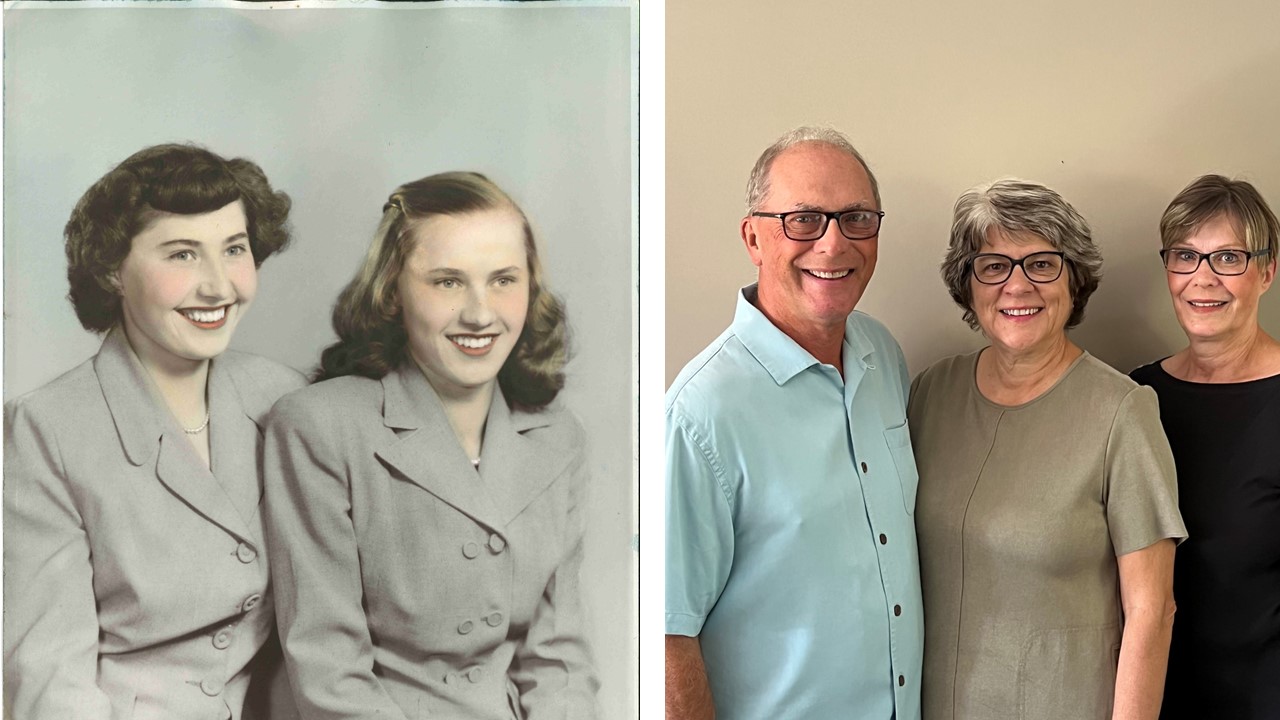
Honouring a Family: The Bilokreli Family Funds
A family fund is a way to remember family members and their contributions to society, and to carry on the family name in a meaningful way for generations to come. There’s no limit to where family funds can be directed, from the education of future doctors and health practitioners to the advancement of research in a particular area of medicine.
The Bilokreli family chose to honour their two aunts – Helen Bilokreli and Eunice Bilokreli – who were the only girls in a family of nine children. Both women were successful in their careers but never forgot their rural Saskatchewan roots, returning to their childhood home in Theodore regularly to help with the preparation of meals for the family harvest and later to provide care for their parents. The women’s strong commitment to health was clear by their continued support to the College of Medicine at the University of Saskatchewan (USask) and Saskatoon City Hospital.
We talked to nephew Bryan Bilokreli about the inspiration for two funds: the Bilokreli Family Donor Advised Fund and the Eunice Bilokreli Research Fund.
How would you describe the two funds?
The original Bilokreli family fund was set up in 2011 when Eunice was still alive. We chose to support a cause called Rural Dementia Action Research (RaDAR). Members of the RaDAR team at USask are challenged to improve the delivery of rural dementia care across the continuum, from early detection and diagnosis to end-of-life care.
Eunice passed away in 2014 and that’s when we started the Eunice Bilokreli Research Fund. We’ve been allocating those funds to the College of Medicine Graduate Student Awards (CoMGRAD). The purpose of the CoMGRAD is to provide support to graduates who demonstrate a passion for research.
How are they awarded? Does the College award them based on applications?
We try to allocate the funds based on the priorities that my aunt had identified when she was still alive in terms of the fields of research or the fields of medicine that she felt most strongly about. When we get the applications or the listings from the College of Medicine, we go through them and identify one, two or three that we feel more strongly about, but we leave it up to the college to make the final decision.
What inspired your family to create these funds?
Both my aunts had dementia. Eunice passed away from dementia although she had several other illnesses and Helen had a brain aneurysm that led towards dementia. We thought that was something we should focus on to recognize their needs and the illnesses they had, especially in the case of Eunice.
We talked to everyone in the family and worked with the development office at the university and her financial advisors. They all agreed that would be a very suitable direction to take.
What do you hope the funds will achieve?
What we’re trying to do is make this a legacy involving both my family and my sister’s family. When we’re not here, somewhere down the road, our family and our two daughters, and my sister’s family and her sons and daughters, will then take up the lead. Right now, we lead but we make sure they’re all involved and aware of what we’re doing.
Why did you choose to support USask?
Before we set up the funds, both of my aunts were regular contributors to health on a regular basis, both to Saskatoon City Hospital and the College of Medicine. These funds were being consistent with their past philanthropy.
Was it difficult to create the funds?
Everyone from the development office was very good about it, whether it was the associate deans we worked with or the development people. Jeff Aramenko was helpful about keeping us informed and updated.
Do you think this will serve as a model for others to create this kind of fund?
I think so. We see this as a legacy to the Bilokreli name. I have two daughters, both married, and they’re not Bilokreli by name, so the name is going to disappear through time. This is a way of honouring the name and keeping it visible. That’s a very personal family approach, but it’s a good way to do it. We plan to maintain the funding in perpetuity, continuing to earn interest and keeping the principal as high as possible so we can keep it going for many years.
Would you recommend to people who can afford it that they consider creating a fund?
Yes, I found the college very flexible since we had areas we wanted to see the money go towards. You can designate it towards any specialty or niche program that is important to you, and they will give you advice and suggestions as to how to work through it.
There’s so much need for research funds and for student funds that all money is welcome. Through CoMGRAD, the College of Medicine matches our donation, so if we give $10,000 a year, they’ll give $10,000 a year.
What would be your advice to donors to get them started?
Discuss it as a family – I think that’s what I would suggest – and determine what area you wish to support and then talk to the College of Medicine and the development office. Tell them you have some thoughts as part of annual giving or an ongoing commitment for research. Maybe it’s a one-year commitment, maybe it’s a five-year commitment. Then ask them how you can make this work so it’s in the best interests of you and the university.
